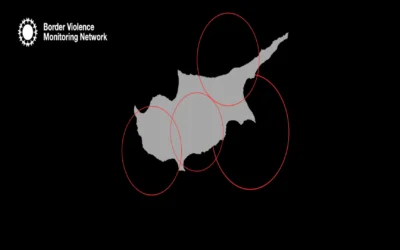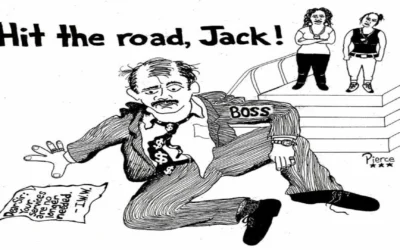Just a quick reminder, in December 2022 the wage-working delivery drivers of Wolt (mostly asylum seekers and students from third countries) self-organised a strike that lasted 10 days, which spread all over the island with hundreds of drivers participating. Early in the strike, it got support from major trade unions (primarily the Cyprus Hotels and Catering Establishment Employees Trade Union of the Pancyprian Federation of Labour) and the then-fledgling IWW-Cyprus, as well as from other groups.
The strikers had to face not only the company, but also the contractors who were directly employing them, many of which had ties to organised crime and far-right political parties. Keep in mind that, unlike most other countries, (bogus) self-employed drivers have it better in Cyprus than employee drivers, mainly because the employee driver is forced to work for a contractor, who gets a cut of around 30-40% of their wage (asylum seekers and students are not allowed to be self-employed).
The strike led to the beginning of negotiations for some form of collective agreement, negotiations that lasted for more than a year and a half, and resulted in the first sectoral collective agreement covering delivery workers in the EU. The agreement (signed on the 4rth of July 2024) will be put in force on the 1st of August, which is very good news.
However, we would be remiss not to draw the attention to the fact that collective bargaining and agreements are not the be-all and end-all of collective organising and industrial action (a view shared by the relevant committees of the ILO btw, just sayin’). In this and every case, it should be closely observed whether it will actually improve conditions (if it’s even enforced), especially since the drivers themselves did not participate en masse in the negotiations.
In fact, most of the strikers, including the vast majority of their vanguard strike committee, have moved on to other jobs, or even to other countries. This is a testament of how inadequate is the traditional forms of collective bargaining when it comes to modern forms of employment. Also, this is a situation that will make the aforementioned necessary close observation almost impossible, since the paid officials of the trade unions who signed it do not work in the sector; moreover, without a militant base of workers ready to fight for its enforcement and protection, any collective agreement is meaningless.
That is why rank-and-file trade unions and true industrial syndicalism are necessary, that is why we need the model of the Industrial Workers of the World!
UPDATE: With the publication of the essential terms of the agreement, we can now comment concretely on some of its problems, without diminishing its general importance and the benefits it can possibly provide to drivers:
- Let’s start with the basics. Obligating contractors to provide equipment to drivers is important. Platform companies (not the contractors) were already providing helmets, delivery boxes and vests to delivery workers, but the drivers had to paid for the equipment, and the money were supposed to be returned to them when they left the job; as a rule, the companies used to find the slightest tear or smudge in the equipment to justify not returning the money. What is more important, however, is the provision of the vehicles (bikes, motorbikes, cars, scooters etc), their service costs, and their fuel. It seems that this equipment and relevant costs are still burdening the drivers.
- Providing a minimum wage of €50 over the national one (€950 for the first six months, €1050 after six months of continuous employment for the same employer) could be considered a good thing, but based on the provision for 40 work hours per week it results to less than €6 per hour gross. More importantly, it is doubtful whether a driver will reach six months of continuous employment for the same employer, for reasons relating to the nature of the profession, as well as the contractors’ legal ability (shared by every employer in Cyprus) to fire any employee before completing six months on the job without providing any reason. We can safely predict that those “fleet management companies” will pass employees between one another, keeping the net wage of drivers under €5 per hour.
- The major trade unions are claiming to be fighting for a 35hr-long workweek, and bragging that their collective agreements provide for, at most, a 38hr-long workweek; this one seems to have slipped through the cracks (its not the only one so we are not that surprised, its somewhat of a trend in agreements that primarily cover migrant workers). Moreover, there is no information regarding how (and if) the 40hr per week limit will be safeguarded. Will there be a limit to the log in possibility of drivers? But the apps are controlled by the platform companies, not the contractors. Will the contractors “instruct” their drivers to only work for 40hr, and pay them the minimum wage? What’s stopping the contractors from not giving such instructions, and just paying the minimum wage regardless of amount of work? Speaking of which, what constitutes “work”? Being logged in on the apps and stand by for orders? What’s stopping a driver from logging in after midnight, when most restaurants in Cyprus are closed (and more power to them we say!)?
- Staying on the same subject, and to prove that our concerns are founded, keep in mind that many of the drivers are students, thus limited by law to work for, at most, 20hr per week. Of course, that law was not enforced, because there is no way to enforce it in this profession. Its enforcement, same as with the collective agreement, relies 100% on the drivers themselves. The only incentive for drivers not to work more is the minimum wage, which is a de facto maximum wage, and there is little doubt that most drivers won’t be happy with a development that prohibits them for working more and earning more. This is not to say that we advocate for a limitless working day; the solution to this is a much higher minimum wage, and a generous provision for overtime. But, of course, overtime and its pay are left for future negotiations…




